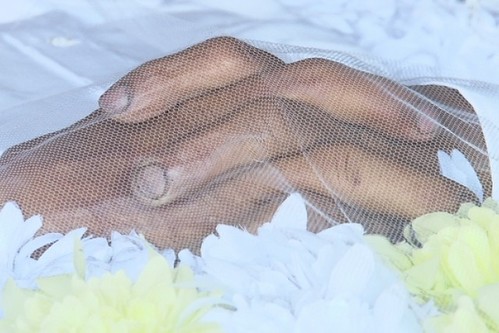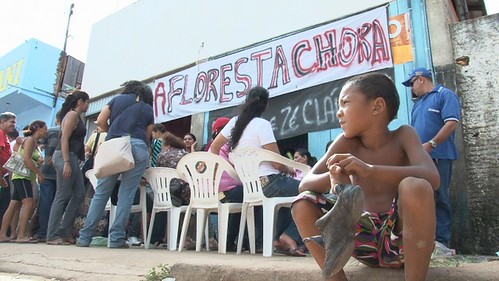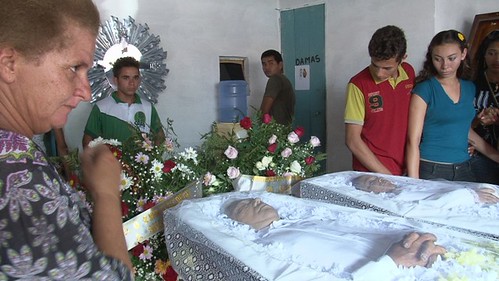THE AMAZON IS CRYING

Photo: Jose Claudio Ribeiro's hands. Maria Elena Romero/Al Jazeera.
[UPDATE 28 May 2001 -- Another activist falls. Adelino Ramos was gunned down in Rondonia on Friday. Bradley Brooks reports "1,150 rural activists have been slain in land conflicts across Brazil in the past 20 years, murders mostly carried out by gunmen hired by loggers, ranchers and farmers to silence those who protest illegal cutting in the forest. Of all those killings, fewer than 100 cases have gone to court. About 80 hired gunmen have been convicted. Only 15 or so of the people who have ordered killings faced charges. And just one of them one is known to be in prison. Impunity rules among the 23 million people spread across the vast Amazon because Brazil's judicial system is weak and corruption among local officials is endemic, activists and federal prosecutors say.Read the full report on killing with impunity.]
Here is Al Jazeera telling it as it was a few days ago in Para.
The Amazon is crying
By Gabriel Elizondo
Thu, 05/26/2011
The family home of Jose Claudio Ribeiro da Silva is a simple, modest 3 bedroom brick building on a dusty side road in Maraba Brazil.
It is fitting for a humble man who told anybody who asked that he preferred to be called simply ‘Ze.’ If you wanted to be formal, ‘Ze Claudio,’ would due.
The house has a small kitchen and a cozy and peaceful backyard with green shrubs providing shade from the sauna-like heat common in this region of Brazil.
Ribeiro did not live here much. He preferred his even simpler home in the Amazon sustainable reserve he ran with his wife, Maria. It is about 40 kilometers from here.
But it’s at his family house, here in Maraba on Wednesday, where I first met Ze and Maria in the cramped living room. Unfortunately, both were in coffins - dead, after being gunned down this week in what police are calling a cold blooded murder likely ordered by Ze's enemies. And Ze had many.
But this was a day of his friends and family.
I was at the house for almost 10 hours on Wednesday. (My video report here)
A steady stream of friends, family, neighbors and other people associated with Ze came by to pass their respects. Many stayed a while. Some all day, sitting on plastic chairs in front of the house. Some stare off to nowhere. What was going through their mind only they know.
It was mostly quiet. There was some crying at times. Lots of hugging. Some just stared at the bodies in the caskets in apparent disbelief. There was no hysterical screaming. These people are Ze’s friends, and they are not a naïve bunch. Most had sunken eyes, weathered skin from years under the sun, and calloused hands from hard work. None wore suit and ties. These we Ze’s people.
Ze loved the forest, so much he used to call the trees his brothers and sisters. He was sickened, he told friends, when 80% of the native forest near his reserve was cut down to 20% in recent years as illegal loggers moved in. Lots of people here feel this way. But few dare do what Ze did. He took pictures on an old digital camera. He filed reports at police stations. He named names.
A relative told me usually nothing came of his denouncements. But it still infuriated powerful people in a region known in Brazil as terra sem lei (land without laws).
So Ze was threatened. He once woke up to spray paint on his house. Another time he came home to find his dog mysteriously dead.
Ze would get anonymous phone calls; “You better shut up, or else.” Then the person hung up.
But Ze didn’t. And wouldn’t. Because, he told friends, he couldn’t. He was the ‘voice of the forest.’
And for that, he famously told an audience at an environmental conference just six months ago, he could get a bullet in his head any day.
On Wednesday, a middle aged man walked up to me outside Ze’s house and without me asking told me: “Ze always said a bullet would get him someday. I never thought that day would actually arrive. Sad.” He then sort of shuffled off, without saying anything more.
Back inside the living room, the two coffins are pushed together. A sign reads: Injustice in the Amazon.
Photo: People pay their last respect to Jose Claudio Ribeiro and his wife, Maria. Maria Elena Romero/Al Jazeera.
A net is placed over each of their covered bodies, to keep flies off their face.
Only the smallest portions of their faces are exposed. Both Ze and Maria had one of their ears cut off by the gunmen, a sign, police tell me, it was a murder for hire and the gunmen needed proof they killed the intended targets.
One young kid outside told me this: “Five thousand reals. That is the going rate here for killing two environmentalists like Ze and Maria. This was a big one, because both were killed.” Five thousand reals is about $3,000, more or less.
Ze’s 73 year old mother is devastated over his death; too upset to speak.
The Amazon reserve where Ze lived has mostly been abandoned since his death. Many people too scared to go back.
Ze’s sister, Claudelice da Silva, was one of the first to arrive at the remote dirt road where they were gunned down.
“To see my brother thrown on the dirt, full of bullet holes – it was the worst thing you could see in your life. Me and my family are deeply upset. But now we have more thirst for justice.”
I ask her: “Is the fact Ze is dead mean the bad guys have won?”
“No,” she says flatly without hesitation. “This fight continues.”
Photo: Jose Claudio Ribeiro sister, pictured, was one of the first to arrive on scene of his killing.
Maria Elena Romero/Al Jazeera
At just about this moment, a little girl not too far from me hunches over, covers her face with her hands and starts weeping uncontrollably. “Who is that?” I ask. “That is my daughter,” Claudelice says. “Her father is not around anymore, so she considered my brother to be her dad. She is taking it hard.”
About a dozen local environmental activists (‘Ze’s students’ a woman tells me) gather in a circle in the backyard and talk where to go from here. One woman says something to the effect of “fight” and “struggle” and “continue.” But there are no easy answers.
As the late afternoon turned to evening on Wednesday, at one point well over 200 people are crowding the block in front of Ze’s house. Someone from the church brings the pews out to the street so people have a place to sit.
Many are watching a projection screen set up in the street playing videos and showing a slideshow of pictures of Ze and Maria.
At one point, someone sets up a radio on the front porch area to play an audio recording of one of Ze’s talks. There is no video. No matter, they gather around, hanging on every word. Lost on many of them is that Ze’s body is literally only a few feet away.

Photo: Outside the Jose Claudio Ribeiro family home the sign says 'the forest is crying.' Maria Elena Romero/Al Jazeera.
Many people on Wednesday worried aloud that Ze and Maria’s death would go unpunished. On the phone, the state federal prosecutor told me there are over 200 unsolved murders in Para state alone involving ‘rural workers’ (usually code word for environmentalists, in these parts).
I heard 5 words a lot on Wednesday: Chico. Mendes. Dorothy. Stang.
Impunity. If you don’t know, Google it. You can draw your own conclusions.
I didn’t hear one person – not one – utter the words Codigal Florestal.
It is dark now. A couple busloads of MST land rights activists arrive to pay their respects. They, along with about 100 people still remaining, light candles on crosses and place them in the neighborhood. It’s almost 11 pm.
A hand made banner has been sitting out in front of the house all day.
It reads: The forest is crying.
Ze won’t be around anymore to wipe away the tears.
And what was the response in Brasilia? John Collins Rudolf of the NY Times Green Blog reports:
In a grim coincidence, on the same day that Mr. da Silva and his wife were assassinated, the Brazilian Congress voted in favor of a controversial bill loosening the national forest code, a decades-old law containing provisions designed to protect the Amazon rain forest from destruction by loggers, farmers and other commercial interests.
The law would open the door to new deforestation and grant broad amnesty to those guilty of illegal forest clearance, analysts said.
During the debate over the revisions, Jose Sarney Filho, a congressman and former environment minister who opposed the changes to the code, spoke of the activists’ murders in a speech to the assembly. He was greeted by boos from the audience, including fellow deputies.
“I couldn’t believe it. They were booing the news of a murder. It was terrible, but it happened,” said Mr. Adario, the Greenpeace director, who witnessed the speech.
Please continue to use the current letter being transmitted by avaaz.org.
The letter, translated from Portuguese, says:
Dear President Dilma,
As a concerned citizen, I ask you to do everything in you power to protect our precious forests, rejecting the current proposal for weakening of the Forest Code. Say no to amnesty for the loggers, to any decrease in APPs [protected areas], and to decentralization of environmental policy.
Please defend the people's interest over private interests and do everything in their power so that no deal can be done until the environmental protections are strengthened rather than weakened.








No comments:
Post a Comment